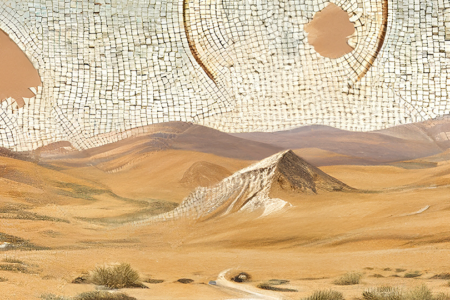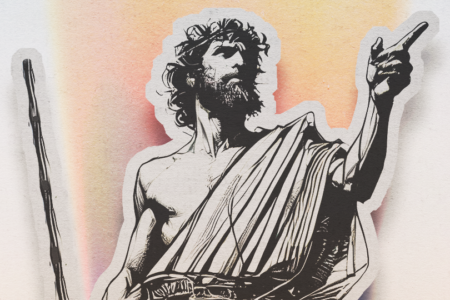Immortality in Jewish Thought PART II — In the Talmud
When we come to that great collection of rabbinic literature known as The Talmud (approximately 2-6 Century, A.D.), we find there a vast storehouse of views and beliefs concerning immortality.
In the Mishnah, the earliest part of the Talmud, is the important treatise, Pirke Abboth, “The Sayings of the Fathers.” There the following thoughts are expressed about the resurrection and future judgment:
Rabbi Elezar Ha-Kappar said: ‘Jealousy, and lust, and ambition drive a man out of the world.’
He used to say: ‘Those who are born (are destined) to die, and those who are dead to live again, and those who live (after death) to be judged. . . .’ God is the framer, the creator, the discerner, the judge, the witness, the accuser, and He shall judge in the hereafter. Before him there is no mistake, no forgetting, no respect of persons, and no bribes, for all is His. Know that all will be accounted for. And let not thy imagination persuade thee that in Sheol there is a place of refuge:
For without thy will thou wast formed, and without thy will wast born, and without thy will thou livest and without thy will thou diest, and without thy will thou shalt give an account before the King of kings, the Holy One, Blessed be He !—Pirke Abboth 4:28, 29 (Second Century A.D.)
The above passage may be considered as the classic position of traditional Judaism in the matter of resurrection since the beginning of the Christian era.
The Idea of Immortality in the First Century
The New Testament is a most reliable source of information concerning the views and divergent opinions among the Jews about immortality in the first century A.D. In some ways it is more accurate than the Talmud because the New Testament is closer to Jewish life and beliefs of that time. It must be remembered that the New Testament preceded by many generations the Talmud, which came into existence in the first six centuries after Christ. It is from the New Testament that we first learn that the Sadducees did not believe in the resurrection.
Then come unto him the Sadducees, which say “there is no resurrection”—Mk. 12. 19. For the Sadducees say that there is no resurrection, neither angel, nor spirit: but the Pharisees confess both—Acts 23:8.
The above passages also indicate that the Pharisees and the rabbis shared the same faith in the resurrection with Christ and with the apostles,
It is clear that in Biblical times, and for many centuries later, the Jews believed both in the immortality of the soul and the resurrection of the body. The ancient Jewish Prayer Book contains many expressions of this faith.
The 13th article of faith by the famous Maimonides included in the Hebrew Prayer Book, reads as follows:
I believe with perfect faith that there will be a resurrection of the dead at the time when it shall please the Creator, blessed be his name, and exalted be the remembrance for ever and ever—The Standard Prayer Book, page 109.
Only in modern times has there been a departure from the ancient faith of Israel. Reform Judaism, while not repudiating immortality of the soul, is vague on this subject. Privately, many liberal rabbis voice unbelief in immortality and resurrection. A Jewish funeral is generally a very sad affair, with much grieving and despair. Faith in the resurrection of the dead, so characteristic of the true Christian, is woefully lacking.
It can be truly said that without faith in a risen Saviour there can be no real faith in the resurrection from the dead.
Immortality in the New Testament
In principle, Jews and Christians are agreed upon the resurrection of the body and the life everlasting. Yet, as in so many other respects, the New Testament gives us a more complete and a more definite doctrine of the resurrection and immortality than can be found in any other Jewish writings.
The Christian faith in the resurrection is firmly anchored in the risen Christ: I am the resurrection, and the life: he that believeth in me, though he were dead, yet shall he live –Jn. 11:25
The Apostle Paul teaches that the denial of the resurrection of the body leads to the denial of the resurrection of Christ.
Now if Christ be preached that he rose from the dead, how say some among you that there is no resurrection of the dead? But if there be no resurrection of the dead, then is Christ not risen: And if Christ be not risen, then is our preaching vain, and your faith is also vain. Yea, and we are found false witnesses of God; because we have testified of God that he raised up Christ: whom he raised not up, if so be that the dead rise not.
For if the dead rise not, then is not Christ raised: And if Christ be not raised, your faith is vain; ye are yet in your sins. Then they also which are fallen asleep in Christ are perished. If in this life only we have hope in Christ, we are of all men most miserable. 1 Cor. 15:12-19
The Resurrection Body
What kind of body will the risen body be? The Apostle Paul tells us that it will be a transformed body. Although it will have some element of identity with the old body, yet the resurrected body will be different, even es the new grain of wheat differs from the seed from which it sprung:
So also is the resurrection of the dead. It is sown in corruption, it is raised in incorruption: It is sown in dishonor, it is raised in glory: It is sown in weakness, it is raised in power: It is sown a natural body, it is raised a spiritual body. There is a natural body, and there is a spiritual body. 1 Cor. 15:42-44.
Although the New Testament teaches the resurrection of all people, yet not every one may look forward with joy to the resurrection.Christ warned his people with these words:
Marvel not at this: for the hour is coming, in the which all that are in the graves shall hear his voice, and shall come forth; they that have done good, unto the resurrection of life; and they that have done evil, unto the resurrection of damnation. Jn. 5:28,29
It is only those who have received Christ as Saviour from sin and as Lord of their lives who have cause to look forward with joyful anticipation to the resurrection from the dead. These can, with Paul, exclaim in triumph:
O death, where is thy sting? O grave, where is thy victory? The sting of death is sin; and the strength of sin is the law. But thanks be to God, which giveth us the victory through our Lord Jesus Christ. Therefore, my beloved brethren, be ye steadfast, unmovable, always abounding in the work of the Lord, forasmuch as ye know that your labor is not in vain in the Lord-1 Cor. 15:55-58
Body, Soul, Spirit
A few words need to be said about the interrelationship between body, soul and spirit.
It is obvious that man has a two-fold nature—material and immaterial, the body and soul.
The body is matter; the soul is the immaterial principle of life. And the Lord God formed man of the dust of the ground, and breathed into his nostrils the breath of life; and man became a living soul. Gen. 2:7
Sometimes the term spirit is used interchangeably with soul:
Then shall the dust return to the earth as it was: and the spirit shall return unto God who give it. Eccl. 12 :7.
Now is my soul troubled—Jn. 12 :27
When Jesus had thus said, he was troubled in spirit.. Jn. 13:21
The division of man into body and soul (or spirit) is called a dichotomy — a two-fold division. Generally, however, the trichotomous theory, the tripartite division of man into body, soul and spirit, is accepted among Biblical scholars, following 1 Thes. 5:23:
And the very God of peace sanctify you wholly; and I pray God your whole spirit and soul and body be preserved blameless unto the coming of our Lord Jesus Christ.
The body is the material vehicle of the soul.
The soul, closely identified with the mind, records, combines, preserves and uses impressions received through the sense organs of the body. It is the seat of feeling, thinking and willing.
The spirit is the image of God.
So God created man in his own image, in the image of God created he him. . . . Gen. 1 :27
The spirit is the seat of God’s indwelling, the organ of divine life. Through the spirit man is related to God and perceives God.
The spirit is the essential part of our being. Life in its final analysis is a spiritual matter.
An animal has soul but not spirit.
With the body man is aware of his environment, of the world around.
Through the soul, he thinks and is aware of himself.
Through the spirit he is conscious of God.
As created by God, man’s body functioned perfectly as the instrument of the soul, the soul as a perfect instrument of the spirit, and the spirit of man, as a perfect instrument of the Spirit of God.
All three, body, soul and spirit, functioned perfectly to fulfill the purpose of God. This purpose was that man should rule the world (Gen. 1:28) in preparation for living eternally with God.
However, man chose to assert himself against his Creator, thus bringing sin into the world. Man’s spirit became alienated from God. His soul became enslaved to the body, which is subject to death.
The whole life of man centers in a permanent conflict and tension between unfulfilled longings.
But God, who is rich in mercy, sent Christ, His only begotten Son, the Messiah, in order to condemn sin and to regain for us, through His obedience, that which man by his disobedience has lost.
Those to whom Christ gives eternal life by faith in Him “shall never perish, neither shall any man pluck them out of my hand.” Jn. 10:28






